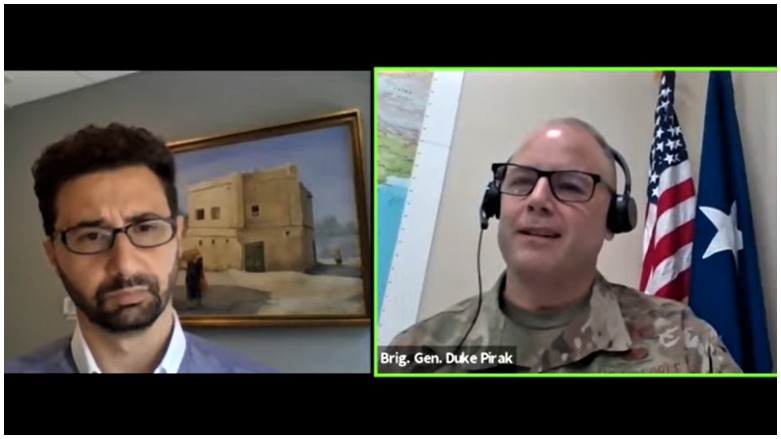
As published by Kurdistan 24 by Laurie Mylroie
WASHINGTON DC (Kurdistan 24) – Brig. Gen. Duke Pirak, CENTCOM’s Deputy Director for Strategy, Plans and Policy, explained that CENTCOM was now looking at how to turn its security relationship with Iraq, currently based on the fight against the so-called Islamic State, into a long-term defense relationship.
Speaking by video conference on Tuesday with the Middle East Institute’s Bilal Saab, Director of the institute’s Defense and Security Program, Pirak explained that the US was now looking at developing its relationship with the Iraqi Security Forces, which is currently embedded in Combined Joint Task Force-Operation Inherent Resolve (CJTF-OIR), into a relationship which is “normalized into an enduring security cooperation program.”
The future of the US presence in northeast Syria, however, appears less clear. Describing the US mission there as “very important,” Pirak revealed that “a political decision about our long-term presence” has yet to be made.
US-Iraq Strategic Dialogue
Pirak explained that he was “encouraged” by the first session of the Strategic Dialogue between Washington and Baghdad, which was held on June 11 by videoconference, because of the coronavirus pandemic.
Read More: US announces strategic dialogue with Iraq
“Clearly, the new government of Iraq wants us to stay,” Pirak said, speaking of the results of that meeting, and Baghdad “is encouraging the transition of our campaign to secure the long-term defeat of ISIS.
“What we want,” David Schenker, Assistant Secretary of State for Near Eastern Affairs, said following the meeting, “is to have a strong, normal, bilateral security arrangement with Iraq, characterized by training, provision of high-quality weapon systems, joint exercises, and senior officers studying at our respective military academies.”
Read More: US-Iraq strategic dialogue to resume this summer
Meanwhile, the Coalition is consolidating its presence in Iraq—”less bases, less faces,” is how Pirak put it, as Coalition forces transfer from numerous smaller sites into a few large military facilities, including Erbil.
Read More: Coalition to continue Iraq operations, as Patriot missiles arrive, and base consolidation proceeds
The consolidation of Coalition troops has been carried out partly as a force protection measure and partly as a result of the territorial defeat of ISIS. This has enabled the Coalition “to focus more on training above the division level,” Pirak explained. “We’re talking about the graduate level of training, institutional capacity building,” as well as “advising and mentoring their leadership.”
Still, Pirak acknowledged, “ISIS has the desire to resurge,” but, he claimed, “doesn’t have the capacity,” noting that “violence levels” are “well below seasonal norms.”
The leadership of the Kurdistan Regional Government (KRG), however, appears to have a slightly different view, as it repeatedly stresses the threat that ISIS poses in the disputed territories.
In a meeting on Tuesday with Brig. Gen. Ernest J. Teichert III, senior defense official and defense attaché-Iraq, at the US Embassy in Baghdad, Prime Minister Masrour Barzani “expressed his concerns regarding the instability” in those areas and called for “the reactivation of the joint security mechanism between the Iraqi army and Peshmerga forces,” a statement from his office explained.
Read More: PM Masrour Barzani meets US senior defense official in Iraq
Pirak also explained, in his discussion with Saab, that the coronavirus had “paused” both Coalition and NATO training of Iraqi forces, while it had minimized work, such as joint patrols.
Northeast Syria-a US withdrawal?
The same is true in northeast Syria, where the Coalition is “also in a bit of a Covid pause,” but “our defeat ISIS efforts continue,” Pirak said.
He described the area of military operations as extremely complex, involving great power competition, as well. If the US withdraws from the region, Russia will likely move in (as well as Iran.)
Pirak stressed that the mission in northeast Syria “is important in terms of securing the long-term defeat of ISIS,” but, nonetheless “we wait a political decision about our long-term presence.”
As the just-published book of National Security Adviser, John Bolton, reveals, President Donald Trump has sought to withdraw US forces from Syria, since at least April 2018, when Bolton assumed that office.
Trump wanted then to turn over responsibility for fighting ISIS in Syria to Arab states. Of course, that didn’t happen, but some 18 months later, Trump sought to leave the area to Turkey. That decision was reversed, in part, but apparently it still remains unresolved.
Mick Mulroy, former Deputy Assistant Secretary of Defense for the Middle East, retired CIA officer, and now National Security Analyst for ABC News, warned against a US withdrawal.
“If the US pulls out our forces from Syria, it would be difficult to continue our counter-ISIS mission there,” Mulroy told Kurdistan 24. “It would diminish our ability to collect intelligence and strain or sever our relationship with key partners.”
“This, and losing the key basing we developed in Syria will increase the risk to our forces, if we have to return for a counterterrorism operation,” he continued.
Nonetheless, “If the political decision is made to withdraw, the Kurdish area of northern Iraq would likely be the hub of our over-the-horizon counter-terrorism and stabilization operations in Syria,” he said.
More generally, Mulroy noted the significance of Pirak’s discussion of US security planning for Iraq and Syria. Mulroy hailed the Coalition’s success in defeating ISIS’ territorial caliphate, but stressed the importance to both the US and Iraq that their security partnership continue.
“If it were to end,” Mulroy concluded, “we could lose all of the gains that came from the sweat and blood of so many servicemen and women, both American and Iraqi.”
Editing by John J. Catherine


